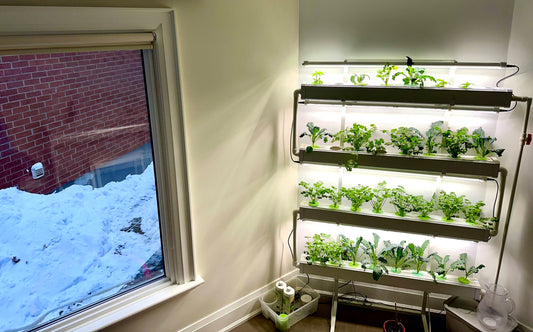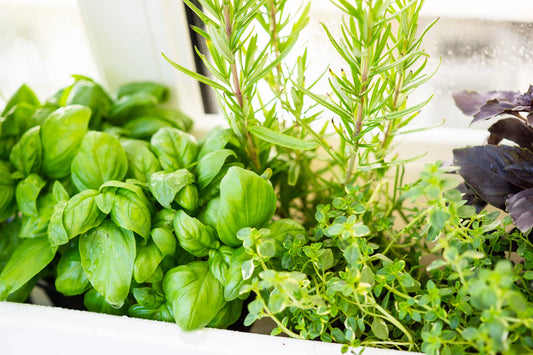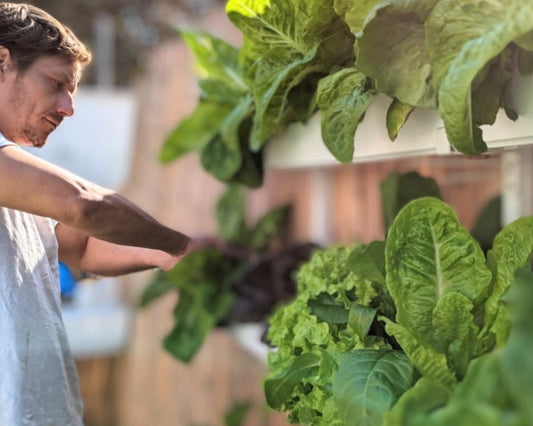Perlite has become a must-have for gardeners and hydroponics enthusiasts. It is lightweight and delivers exceptional drainage to boost plant growth.
In this guide, we dive into what makes perlite special, from its unique manufacturing process to its powerful benefits.
We also compare it with expanded clay pebbles—another top-tier growing medium from Nature Tech—so you can choose the best option for your plants.
Let’s get growing!

What is Perlite?
When processed, Perlite is a volcanic glass that becomes a lightweight, porous material that improves soil aeration and drainage.
It’s particularly useful for hydroponics, as it:
- allows roots to breathe,
- reduces waterlogging,
- and supports plant growth.
Perlite’s neutral pH, sterile nature, and ability to retain some moisture without becoming waterlogged make it versatile across various plant-growing methods.

How is Perlite Made?
Perlite starts as a natural form of obsidian—a type of volcanic glass with a high water content.
To turn it into the form used in gardening, perlite is mined, crushed, and heated to around 1,600 degrees Fahrenheit (870 degrees Celsius).
This extreme heat causes the water inside the perlite to vaporize, expanding the particles up to 20 times their original size.
The result? We recognize the lightweight, porous, white granules as perlite.
Benefits of Perlite for Plants and Hydroponics
Perlite’s structure and properties make it particularly useful in both traditional gardening and hydroponic systems:
- Lightweight: Due to its low density, perlite is easy to handle and mix into soil or soilless blends.
- Aeration and Drainage: Its porous structure effectively allows oxygen to reach roots, reducing the risk of rot and fostering healthier root development.
- Moisture Retention: Although it doesn’t hold water like soil, perlite retains enough moisture to benefit plants without over-saturation.
- pH Neutral: Perlite does not alter the pH of the soil or nutrient solution, making it ideal for maintaining a stable growing environment.
In hydroponics, perlite is frequently used to start seedlings or as part of soilless mixes that provide the root zone with oxygen while maintaining adequate moisture.

Uses of Perlite in Gardening and Hydroponic Systems
Perlite is a versatile addition in gardening and hydroponics for these key applications:
- Rooting Cuttings: It provides a clean, well-aerated environment for new roots to develop.
- Soilless Mixes: Many hydroponic systems use perlite to create soilless mixes that support plant growth while allowing roots to access oxygen easily.
- Standalone Medium in Hydroponics: In certain hydroponic setups, perlite is used alone, especially in systems like ebb-and-flow or wick systems, where it can help control water retention and oxygenation.
In traditional gardening, perlite is often mixed into potting soil to improve drainage, prevent soil compaction, and encourage strong root systems, especially for container plants.
Comparing Perlite and Expanded Clay Pebbles in Hydroponics
While perlite is widely used, expanded clay pebbles (hydroton) offer a valuable alternative, especially for hydroponics enthusiasts.
Here’s how they compare:
- Weight and Durability: Expanded clay pebbles are heavier than perlite, making them less likely to float in a hydroponic system. They are also more durable and reusable, making them cost-effective over time.
- Water Retention: Both materials are good for aeration, but clay pebbles retain less moisture, which can be preferable for certain hydroponic setups.
- Structure and Reusability: Expanded clay pebbles maintain their shape and can be cleaned and reused, while perlite tends to break down over time.
Though each medium has its strengths, the choice between perlite and expanded clay pebbles often depends on the specific needs of your plants and hydroponic setup.
Environmental Impact of Perlite
Perlite mining and processing require considerable energy due to the high heat involved in expansion, raising questions about sustainability.
While it’s durable and doesn’t break down easily, some gardeners seek alternatives with a lower environmental impact.
Expanded clay pebbles offer one such option, as they’re also durable and reusable.

Is Perlite Right for Your Garden or Hydroponic System?
Perlite offers numerous benefits for hydroponics and gardening, from improving aeration and drainage to providing a pH-neutral, sterile environment for plants.
Perlite can support healthy plant development, whether growing in soil, soilless mixes, or a hydroponic setup.
Looking for a reusable, highly durable medium? Explore our store and consider expanded clay pebbles a versatile option with similar benefits to perlite.
Why Nature Tech?
- Our hydroponic systems save up to 90% more water than traditional growing methods.
- All hydroponic growing systems are designed for modern life with maximum yield, minimum effort, and endless beauty & joy.
- Our systems are made of food-safe plastics that don't contaminate the water with unhealthy compounds.
- Our compact and adaptable set-up can be used in large indoor spaces or a small balcony – wherever you choose, your plants will flourish.
- Our home-growing systems are easy to use - even for beginner gardeners!
- With our systems, your plants grow up to 3x faster than in soil, so you’ll save more time!
- We’re here to offer help every step of the way. If you need advice or have any doubts, feel free to reach out to us!




